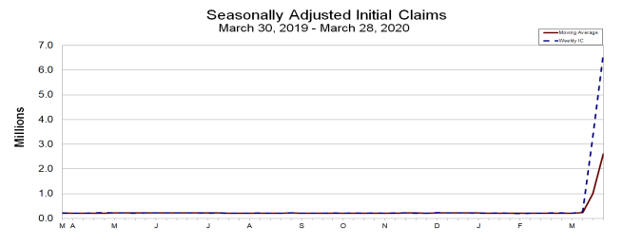The Department of Labor reported that 6,648,000 Americans filed for unemployment insurance benefits in the week ending March 28, 2020 as the COVID-19 pandemic continues to shut down many businesses and much of the economy. This was an increase of 3,341,000 from the previous week’s upwardly revised level of 3,307,000. While last week’s report shattered records, this week’s report was even more shocking due to the magnitude of the increase. The speed and scale of the job losses is unprecedented. In the past two weeks, 6.5% of employed people or nearly 10 million people have filed claims according to Bloomberg analysis. It was the highest level of initial claims in the history of the series. At its worse during the Great Recession, there were 665,000 first-time claims filed in the week ended March 28, 2009. That was second only to the week ended October 2, 1982, when 695,000 first-time claims were filed.

Continuing claims for regular benefits, which are reported with an extra week’s lag, rose 1,245,000 to 3,029,000.
The largest increases in initial claims for the week ending March 21 were in Pennsylvania, Ohio, Massachusetts, Texas and California. Many states reported increased layoffs in service-related industries broadly and in the accommodation and food services industries specifically, as well as in health care and social assistance, and the travel and transportation industries.
The increase in unemployment claims is a preview of the March unemployment rate to be announced by the BLS tomorrow, on April 3rd. Most analysts expect it to rise from its February 2020 50-year low of 3.5%, but the larger impact will likely show up in the figures in the April employment situation report due to the timing of the surveys. The majority of the reported layoffs occurred after the Labor Department’s reference week in the March report. In response to the expected sharp slowdown in the economy, the President signed into law a $2 trillion economic stimulus rescue package that broadly expands unemployment benefits.
About Beth Mace
Beth Burnham Mace is a special advisor to the National Investment Center for Seniors Housing & Care (NIC) focused exclusively on monitoring and reporting changes in capital markets impacting senior housing and care investments and operations. Mace served as Chief Economist and Director of Research and Analytics during her nine-year tenure on NIC’s leadership team. Before joining the NIC staff in 2014, Mace served on the NIC Board of Directors and chaired its Research Committee. She was also a director at AEW Capital Management and worked in the AEW Research Group for 17 years. Prior to joining AEW, Mace spent 10 years at Standard & Poor’s DRI/McGraw-Hill as director of its Regional Information Service. She also worked as a regional economist at Crocker Bank, and for the National Commission on Air Quality, the Brookings Institution, and Boston Edison. Mace is currently a member of the Institutional Real Estate Americas Editorial Advisory Board. In 2020, Mace was inducted into the McKnight’s Women of Distinction Hall of Honor. In 2014, she was appointed a fellow at the Homer Hoyt Institute and was awarded the title of a “Woman of Influence” in commercial real estate by Real Estate Forum Magazine and Globe Street. Mace earned an undergraduate degree from Mount Holyoke College and a master’s degree from the University of California. She also earned a Certified Business Economist™ designation from the National Association of Business Economists.
Connect with Beth Mace
Read More by Beth Mace